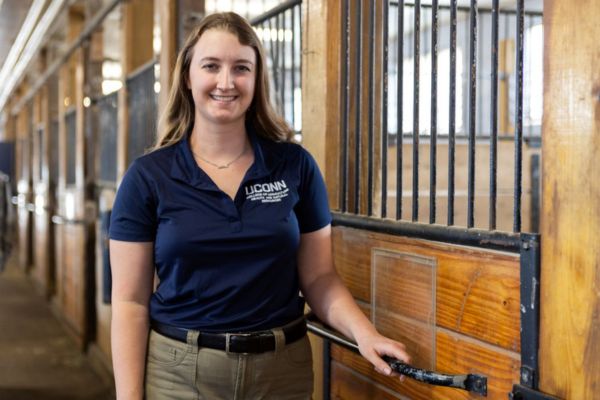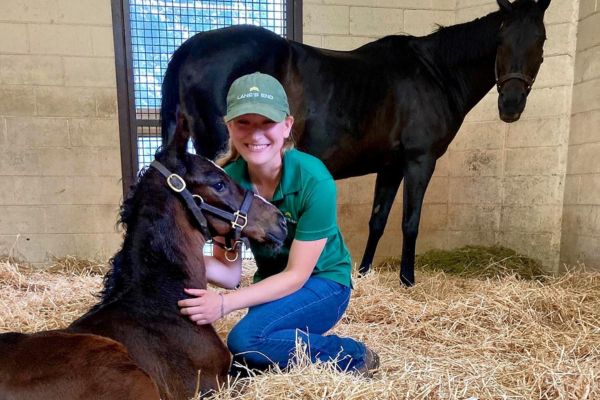Animal Science BS
Business
Area of Interest
Overview
The Business area of interest explores the intersections between the work of the professional scientist and the needs of commercial industries involved in the production, processing, distribution and preparation of animal food products, preparing students for employment in a variety of animal agriculture focused fields. The sequence of courses is structured to enable students to develop knowledge and skills in applied and resource economics, business management and marketing, and agriculture policy.
Requirements
Animal Science majors must pass all courses from Group A, at least one course from Group B, at least one course from Group C, and one additional course from either Group B or C. No single class can satisfy more than one requirement.
Every undergraduate student in a baccalaureate degree program in the University, on all campuses, must complete the Common Curriculum. The Common Curriculum requires students to complete six Topics of Inquiry and three Competencies. All students must complete a minimum of 40 credits of coursework approved for the Common Curriculum.
Students must meet a set of requirements established by the college in addition to the University's Common Curriculum requirements. For more information, see the College of Agriculture, Health and Natural Resources section of the Undergraduate Student Catalog.
Sample Four-Year Plan
This is an example schedule for planning purposes only and is meant to be a guide for students and advisors. 120 credits total needed to complete degree. For official degree information, please contact the Degree Audit section of the Office of the Registrar and speak with your advisor.
- ANSC 1001: Introduction to Animal Science (3 Credits) — The biological, physical, and social factors that influence animal production and utilization.
- BIOL 1107: Principles of Biology I (4 Credits) — Designed to provide a foundation for more advanced courses in Biology and related sciences. Topics covered include molecular and cell biology, animal anatomy and physiology. Lab exercises include dissection of preserved animals. CA 3-LAB.
- Information Literacy (4 Credits): To satisfy the Information Literacy requirement, students must pass at least one of the following: ENGL 1007 (Seminar and Studio Writing and Multimodal Composition), ENGL 1010 (Seminar in Academic Writing), ENGL 1011 (Seminar in Writing through Literature).
- UNIV 1810: Animal Science Learning Community (1 Credit) — A course designed to assist students in adjusting to the University of Connecticut and to improve academic performance. Students will be exposed to UConn resources and facilities, enhance their academic and interpersonal skills, and learn strategies for problem solving and time management.
- ECON 1201: Principles of Microeconomics (3 Credits) — How the invisible hand of the market functions through the economic decisions of firms and individuals. How prices, wages and profits are determined, resources are allocated and income is distributed. Topical subjects (e.g., energy policy and health care). CA 2.
- ANSC 1111: Principles of Animal Nutrition and Feeding (3 Credits) — Digestive anatomy of various species and the classes of nutrients including their digestion, metabolism and sources. Nutrient requirements and feeding standards for livestock, companion animals, exotics and aquatics for purposes of reproduction, lactation, growth, work and maintenance. Classes of feedstuffs, their characteristics, proper utilization, formulating rations and nutritional programs for animal enterprise. Taught with SAAS 113.
- BIOL 1108: Principles of Biology II (4 Credits) — Designed to provide a foundation for more advanced courses in biology and related sciences. Topics covered include evolution and population genetics, plant physiology and diversity, animal diversity and behavior, and ecology. CA 3-LAB.
- STAT 1100Q: Elementary Concepts of Statistics (4 Credits) — Standard and nonparametric approaches to statistical analysis; exploratory data analysis, elementary probability, sampling distributions, estimation and hypothesis testing, one- and two-sample procedures, regression and correlation. Learning to do statistical analysis on a personal computer is an integral part of the course.
- Common Curriculum OR MATH OR STAT Course (3-4 Credits)
- ECON 1202: Principles of Macroeconomics (3 Credits) — The organization and function of the economic system as a total unit. Economic decisions, institutions, and policies that determine levels and rates of growth of production, employment, and prices. Topical subjects (e.g., government budget deficits and current interest-rate policy). CA 2.
- PATH 2100: Anatomy and Physiology of Animals (4 Credits) — A study of the anatomy and physiology of animals with reference to pathological changes of the component parts of the body.
- ANSC 3121: Principles of Animal Genetics (3 Credits) — Principles of Mendelian and molecular genetics. Biosynthesis and function of DNA, RNA, and protein. This course also includes introductions to population and quantitative genetics. Information on molecular methods of genetic analysis and examples of genetics in animals of agricultural significance are also provided.
- MATH 1070Q: Mathematics for Business and Economics (3 Credits) — Linear equations and inequalities, matrices, systems of linear equations, and linear programming; sets, counting, probability and statistics; mathematics of finance; applications to business and economics.
- Common Curriculum OR Group B ANSC Elective Course (3-4 Credits)
- ARE 1150: Principles of Applied and Resource Economics (3 Credits) — An introduction to microeconomic analysis with applications to food, nutrition, health, natural resources, and the environment. Topics include consumer and firm behavior, supply, demand, markets, and economic policy. CA 2.
- ANSC 3122: Reproductive Physiology (4 Credits) — A study of the reproductive anatomy and physiology of domestic animals. Laboratory will include macro and micro anatomy, hormone action, and techniques used in reproductive management of domestic animals.
- ANSC 3194: Career Paths in Animal Science (1 Credit) — A discussion of current employment opportunities in animal sciences. In addition, students will prepare resumes and make oral presentations.
- CHEM OR Group B ANSC Elective Course (3-4 Credits)
- CHEM OR Group B ANSC Elective Course (3-4 Credits)
- ARE 2215: Business Management (3 Credits)** — Analysis of marketing, management, and financial decision-making tools in agribusiness.
- Group B/C ANSC Elective Course (3-4 Credits)
- Group B/C ANSC Elective Course (3-4 Credits)
- CHEM Course (3-4 Credits)
- ARE 3225: Price Analysis and Futures Trading (3 Credits)** — Principles and applications of market price determination, with special emphasis on the use of futures markets for profit and price risk management. Includes food and energy case studies, internet applications, and a futures simulation exercise.
- ARE 3221: Managerial Economics and Business Strategies (3 Credits)** — The application of microeconomic analysis to decision-making techniques of businesses and management units with a particular focus on the food industry covering topics such as electing or developing products, deciding on product output and pricing, organizational design, promotional strategies, worker hiring and training, and investment and financing.
- Group B/C ANSC Elective Course (3-4 Credits)
- Group B/C ANSC Elective Course (3-4 Credits)
- CHEM Course (3-4 Credits)
- ARE 2260: Food Policy (3 Credits)** — Analysis of food and agricultural policies in the United States and abroad. Designed for students with diverse departmental affiliations.
- Common Curriculum Course (3 Credits)
- ANSC W* OR Elective Course (1-3 Credits)
- Group B/C ANSC Elective (3-4 Credits)
- Group B/C ANSC Elective (3-4 Credits)
- ARE 2210: Essentials for Accounting and Business (3 Credits)** — An analysis of basic business principles, fundamentals and concepts for agribusiness entrepreneurs. Taught with SARE 460.
- 2000-Level Related OR Elective Course (3 Credits)
- MGMT 3101 OR MKTG 3101 (3 Credits)
*W course must be taken with the corresponding C course.
- ANSC W* OR Elective Course (1-3 Credits)
- Group B/C ANSC Elective (3-4 Credits)
- Group B/C ANSC Elective (3-4 Credits)
- ANSC 3452** OR ANSC 4662W** (3 Credits)
- MGMT 3101 OR MKTG 3101 (3 Credits)
- Elective Course (3 Credits)
*W course must be taken with the corresponding C course.
- ACCT 2001: Principles of Financial Accounting
- Credits: 3
- Offered: Fall, Spring
- ARE 1150: Principles of Applied and Resource Economics
- Credits: 3
- Offered: Fall, Spring
- ARE 2215: Business Management
- Credits: 3
- Offered: Fall, Spring
- ARE 2260: Food Policy
- Credits: 3
- Offered: Spring
- ARE 3221: Managerial Economics & Business Strategies
- Credits: 3
- Offered: Fall
- Prerequisites: ARE 1150, ECON 1200 or ECON 1201
- ARE 3225: Price Analysis and Futures Trading
- Credits: 3
- Offered: Fall
- Prerequisites: ARE 1150, ECON 1200 or ECON 1201; STAT 1000Q, 1100Q or Eq.
- ARE 4217: Business Finance & Investment Management
- Credits: 3
- Offered: Fall
- Prerequisites: ARE 1150, ECON 1200 or ECON 1201
- ARE 4275: Managerial Economics
- Credits: 3
- Offered: Fall
- BLAW 3175: Legal and Ethical Environment of Business
- Credits: 3
- Offered: Fall
- BLAW 3671: Contract and Property Law
- Credits: 3
- Offered: Spring
- COMM 1100: Principles of Public Speaking
- Credits: 3
- Offered: Fall, Spring
- ECON 1201: Principles of Microeconomics
- Credits: 3
- Offered: Fall, Spring
- ECON 1202: Principles of Macroeconomics
- Credits: 3
- Offered: Fall, Spring
- MATH 1070Q: Mathematics for Business and Economics
- Credits: 3
- Offered: Fall, Spring
- MATH 1071Q: Calculus for Business and Economics
- Credits: 3
- Offered: Fall, Spring
- MGMT 3101: Managerial and Interpersonal Behavior
- Credits: 3
- Offered: Fall, Spring
- MKTG 3101: Introduction to Marketing Management
- Credits: 3
- Offered: Fall, Spring
- STAT 1100Q: Elementary Concepts of Statistics
- Credits: 4
- Offered: Fall, Spring


